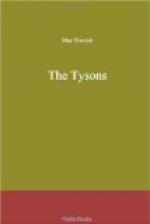This is what she sang; but Louis only came in for the last two verses.
“Oh feet that would
be roving,
I will not bid you stay,
Though my heart should break with loving,
When love is far away.
(Dim.) “Oh heart that would be sleeping,
I
will not wake you. No,
You
shall hear no sound of weeping,
No
footsteps come and go.
“Then come not for
my calling,
Roam on the livelong day;
Some time when night is falling,
Love will steal home and stay.
“Or sleep, and fe-ear
no waking,
Sleep on, the li-ights are low,
Some time when dawn is breaking,
Love will awa-ake—awa-ake,
(Cresc.) Love will awa-ake and know.”
That was the sort of song Tyson liked; and well, as Mrs. Nevill sang it, Stanistreet liked it too. And Stanistreet was not in the least musical.
“What—you here again?” said she, swinging round on her music-stool. “That’s a jolly crescendo, isn’t it? But they’re the silliest words, don’t you think? As if love ever came home to stay if he could help it. He might put up a few things in a portmanteau, and run down from Saturday to Monday, perhaps, and—the lady was very accommodating, wasn’t she?”
Stanistreet frowned and champed the ends of his mustache. This was not at all the mood he desired to find her in.
“Don’t be cynical,” said he; “it’s not like you.”
“Dear me—what shall I be then? What is like me?” She threw herself back in a chair, kicked out her little feet, and yawned. It reminded Louis unpleasantly of the attitude of the woman in the Marriage a la Mode. Then she chattered; and it struck him, as it had struck him more than once before, that Tyson had found his wife’s head empty and furnished it according to his own taste. She was always quoting Tyson; and as there was not the least indication of inverted commas, it was hard to tell which was quotation and which was the original text. This creature of fitful, unbalanced mind and reckless speech was certainly the Mrs. Nevill Tyson he had sometimes seen at Thorneytoft; but it was not the Mrs. Nevill Tyson of last night, nor even of the other day, that afternoon when her eyes said, as unmistakably as eyes could say anything, that she would not accept defeat.
Another moment and the expression of her face had changed again; he saw something there that he had never seen before, something unguarded and appealing. He was near the end of doubt.
He felt that if he stayed with her another moment he would lose his head, and he did not want to lose it—yet! He struggled desperately between his desire to stay and his will to go—if there was any difference between desire and will.
His struggles were cut short by the entrance of Tyson.
He walked into the room at half-past five, greeted Stanistreet cheerfully (his eyes twinkling), ordered fresh tea, and began to talk to his wife as if nothing had happened. If Louis had not known him so well, he would have said he was immensely improved since the remarkable occasion on which they had last met. He had quarreled with his best friend; he had betrayed his wife and then left her; and he could come back with a twinkle in his eye.




